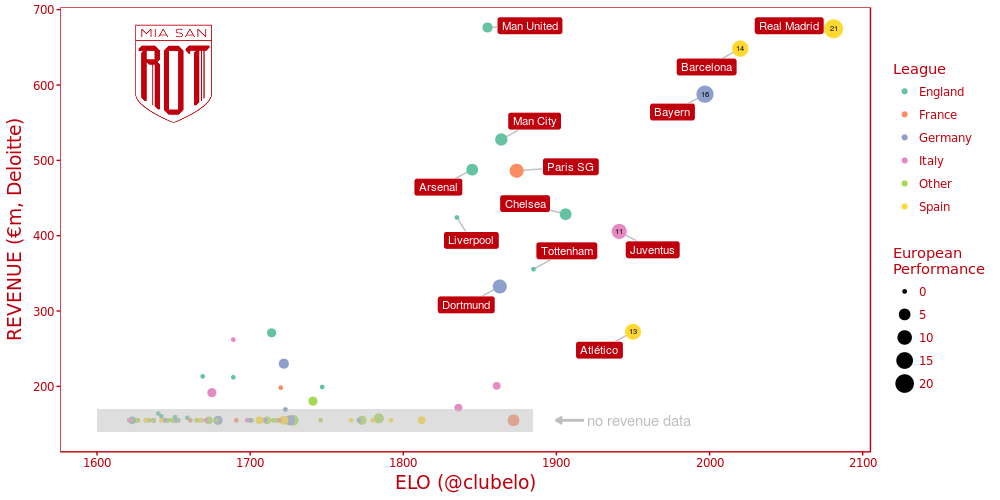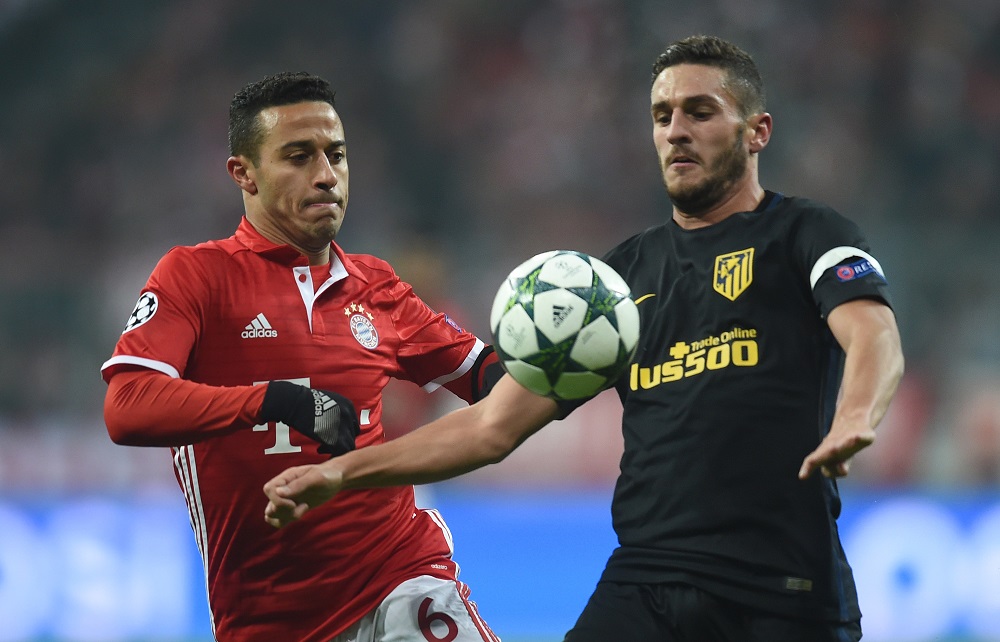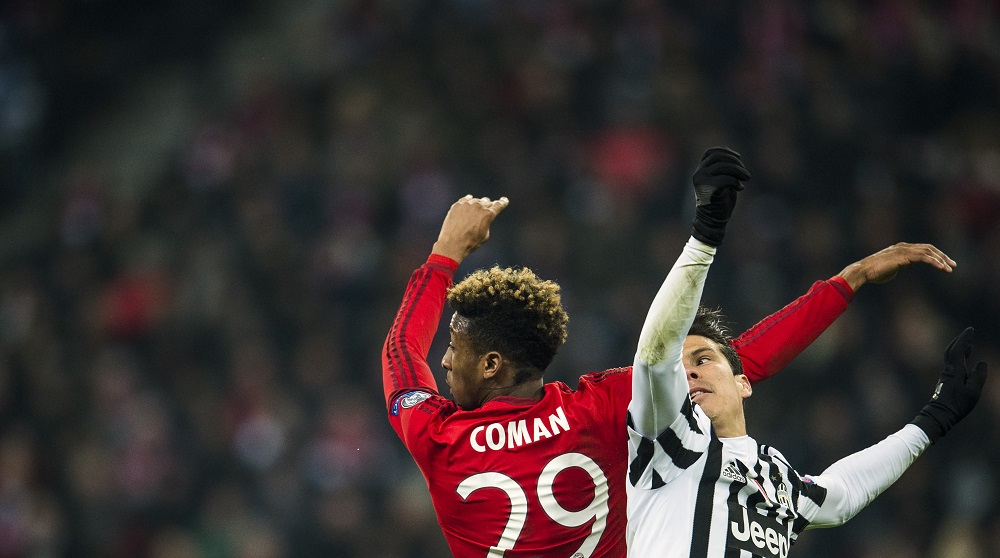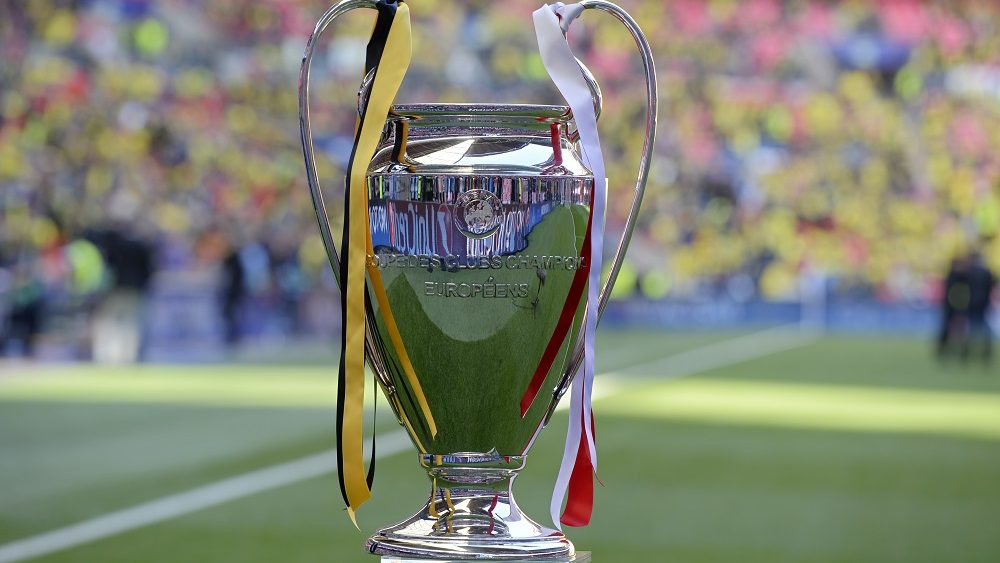Stats & Links: Football isn’t financial mathematics
How much sporting success can income buy you?
To shine a light on this, Deloitte’s financial data will be compared with various sporting signs of success; on the one hand with the professional ELO model, and on the other with a creation of our own called “European Performance”.

Disclaimer: for the clubs where data concerning their income according to Deloitte logic is not available, their income was estimated as just below the 30th club in the Deloitte Money League (€155 million). That brings with it a certain vagueness, but for this article it serves its purpose.
Deloitte vs ELO
ELO is a rating which can describe the strengths of players (or teams). It found its start in chess. To explain it in a very, very simplified way, every player has ELO points and the winner of a tie gets ELO points written off against the opponent. Depending on the strengths of the players involved and the result, more or fewer points are exchanged.
For this comparison, the ELO ratings of the website ClubELO have been used. The website publishes daily, cross-league ELO ratings for each club, covering all European football clubs and competitions.
The first thing to notice is that a total of six of the Deloitte top 20 don’t appear in the ClubELO top 20. Out of the total of 30 in the Deloitte list, as many as 11 are missing from the ClubELO list.
Above all, the middle-class clubs in the mega-rich Premier League are only partly able to convert their income into success on the pitch. West Ham United (17th in Deloitte’s list, 60th in ClubELO’s), Crystal Palace (26th vs 79th), West Bromwich Albion (27th vs 78th), Bournemouth (28th vs 69th) and Stoke (29th vs 65th) are all among the top 30 clubs in Deloitte’s list, but don’t even break into the top 60 clubs according to ClubELO.

(Image: CHRISTOF STACHE/AFP/Getty Images)
Yet top clubs in England also achieve below-average places in ClubELO measured by their income. Only Chelsea and Tottenham Hotspur come off well, who despite significant deficits boast a better ClubELO rating than their national competitors from Manchester or Arsenal.
A positive ClubELO anomaly is AS Monaco, which is not in the Deloitte top 30 but is as high as ninth in the ClubELO rankings. Other examples of clubs who get proportionally a lot of ClubELO points out of their limited financial strength are Spanish representatives Sevilla (17th), Villarreal (18th), and Athletic Bilbao (20th). None of the three clubs are in the Deloitte top 30, but are all in the ClubELO top 20.
The ClubELO top five clubs give off a varied picture. On the one hand, the three clubs with the highest ClubELO ratings are also in the Deloitte top four (Real Madrid, Barcelona, Bayern Munich), but behind them are Juventus and Atlético Madrid, two clubs who are only listed at 10th and 13th in Deloitte’s list respectively, and thus well behind the top English clubs or PSG.
National competitions also come into play in the ClubELO calculations. As a result, teams who dominate in their leagues (Bayern, Chelsea, Juventus, Monaco) are “structurally advantaged”.
Deloitte vs European Performance
But of course ELO points and national competitions interest clubs less than fame and glory (see: prize and TV money) in the Champions League. In order to be able to put a stronger emphasis on Champions League success, the clubs were rewarded for achieving the following “fame and glory levels” in the Champions League in the last five seasons according to the following points system: winners 5, finalists 4, semi-finalists 3, quarter-finalists 2, round of sixteen 1. This admittedly somewhat haphazard construct is called “European Performance”.
At first glance, a link between income and sporting success can be identified. In Real Madrid the most successful club in the last five years (21 points) has also been at the top end of the Deloitte Money League for years.
Completing the Champions League points podium are the old ClubELO acquaintances Bayern Munich (16) and FC Barcelona (14), both also in Deloitte’s top four. If you calculate a ratio using the Deloitte turnovers and the Champions League points, all three clubs land in an area between €30 million and €50 million per Champions League point.
More interesting, however, are of course the anomalies. In a positive sense, again the Rojiblancos from Spain (13) and the Old Lady from Italy (11) come to mind. Both are among the five most successful clubs in terms of Champions League points, but only come in at 10th and 13th in Deloitte’s list respectively. Their ratios come in at €21 million and €37 million per Champions League point respectively. Other clubs with outstanding ratios: Monaco (€31 million/Champions League point), BVB (€37 million), and FC Porto (€39 million).

(Image: ODD ANDERSEN/AFP/Getty Images)
In contrast, there are a range of clubs who perform rather below-average in the Champions League in comparison with their incomes. Leading this squad is the club with the highest income in the world, Manchester United, which was only able to gain three Champions League points in five years, with a ratio of €225 million per point to show for it. The rest of the Premier League representatives also have higher-than-average ratios, with ratios from €80 million and €140 million per point across the board.
Liverpool (9th) and Tottenham Hotspur (11th) are the highest-ranked clubs in the Deloitte list to not have even reached the knock-out stages in the last five years, thus not gaining a single Champions League point. These two clubs qualifying for the Champions League round-of-16 in the current season, then, is not actually a sporting surprise, but rather an expression of the financial reality.
To sum up, with the English clubs the conclusion can be drawn that the income level across all clubs is moving at a rate incomparable with that of the rest of the leagues. As a result, above-average incomes are required to qualify for the Champions League via national competitions. This additional financial power, however, fizzles out as a success-increasing effect in European competition.
But Serie A is also far below the average in terms of the relationship between income and sporting success – up until Juve. Ratios of income and Champions League points there even dwarf those in the Premier League at times: Napoli (€201 million/Champions League point), AS Roma (€172 million), AC Milan (€96 million).
Bottom line
The European Performance ratings generally confirm the assertions made by ClubELO, above all regarding the dominance of the top five clubs (Real, Barca, Bayern, Atlético, Juve) and the below-average performance of the Premier League. In addition, it becomes clear that in the Serie A Juventus is the sole club capable of competing in the Champions League, despite two further clubs in the Deloitte top 20 in Inter (15th) and Napoli (19th).
Links of the week
The cost of feeding a Bundesliga team | Deutsche Welle
Jupp Heynckes’ 2017/18 treble chasers: the best Bayern Munich side ever? | Chris Mayer-Lodge | Bundesliga.de
Julian Green on U.S. hype, fighting at Bayern, life at Greuther Furth | Stephan Uersfeld | ESPN FC
Squad recruitment cost: Manchester City breaks its own record | CIES Football Observatory
Current Miasanrot-articles
3 Things We Noticed: FC Bayern – FC Schalke 04 2-1 (2-1) | Christopher
Current statistics and visualizations
You are currently viewing a placeholder content from X. To access the actual content, click the button below. Please note that doing so will share data with third-party providers.





